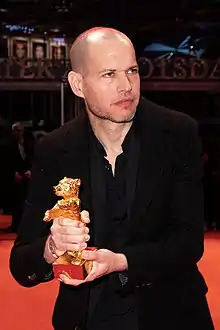Nadav Lapid
Nadav Lapid (Hebrew: נדב לפיד) is an Israeli screenwriter and film director. Film critics consider him to be among the most internationally acclaimed filmmakers from Israel.[1][2][3]
Nadav Lapid | |
|---|---|
 Lapid holding Golden Bear at the 69th Berlin International Film Festival | |
| Born | |
| Nationality | Israeli |
| Education | Tel Aviv University Paris 8 University Sam Spiegel Film and Television School |
| Awards | Locarno Festival Special Jury Prize (2011) Golden Bear (2019) |
Biography
Lapid was born in Tel Aviv, Israel,[2] to a family of Ashkenazi Jewish descent. He is the son of writer Haim Lapid and film editor Era Lapid, he studied philosophy at Tel Aviv University, moving to Paris after his military service in the Israel Defense Forces. He returned to Israel to pursue a degree at the Sam Spiegel Film and Television School in Jerusalem.[4]
Lapid is married to Naama Preis, an Israeli actress; they reside in Tel Aviv.[3]
Career
Lapid's debut feature film Policeman won the Locarno Festival Special Jury Prize at the Locarno International Film Festival in 2011.[5] His 2014 film The Kindergarten Teacher was featured in the 2014 International Critics' Week. Lapid was named as a member of the jury of the International Critics' Week section of the 2016 Cannes Film Festival.[6]
He became a recipient of the Chevalier des Arts et des Lettres in 2019.[5] Nadav Lapid’s film Synonyms won the Golden Bear award at the 69th Berlin International Film Festival in February 2019.[7] Lapid won the IFFI Best Director Award for the film at the 45th International Film Festival of India in November 2014.[8]
Reception
Lapid is considered by the film critics to be among the most acclaimed filmmakers from Israel.[1] He has gained reputation for "thematically and formally challenging work".[9] His work frequently involves criticism of Israeli nationalism and identity.[10][11] Lapid, commenting on the reception of his work, states that we "need someone to be in the opposition, to upset the power structure of cinema, to want to lock horns with it".[11]
The Kashmir Files
In November 2022, Lapid was invited to head the jury at the 53rd International Film Festival of India (IFFI) in Goa. Assessing the fifteen entries in a closing speech, he, on the behalf of the jury, singled out The Kashmir Files for pointed criticism: it was "vulgar propaganda", he said, and an "inappropriate [submission]", which had shocked his fellow jury members.[12]
Lapid's remarks gave rise to a controversy in Indian politics, drawing backlash from the supporters and the members of the Bharatiya Janata Party, which had promoted the film, but receiving support from political opposition.[12] Naor Gilon, Israel's ambassador to India castigated Lapid over Twitter, finding his remarks as presumptuous and insensitive; other diplomats from Israel supported Gilon.[12][13] In subsequent interviews, Lapid stood by his remarks;[14][15] his fellow jurors — except Sudipto Sen, who would go on to direct The Kerala Story, widely characterized as Islamophobic propaganda — reiterated their support for his observations.[16][17][18]
Filmography
- Road (short film) (2005)
- Emile's Girlfriend (2006)
- Policeman (2011)
- Ammunition Hill (short film, features in Footsteps in Jerusalem) (2013)
- The Kindergarten Teacher (2014)
- Why (short film) (2015)
- Diary of a Wedding Photographer (2016)
- Synonyms (2019)
- Ahed's Knee (2021)
References
- Hoberman, J. (30 July 2015). "J. Hoberman Reviews Nadav Lapid's Insular New 'The Kindergarten Teacher'". Tablet Magazine. Retrieved 29 November 2022.
[Lapid's] two features [..] have made him the most internationally acclaimed Israeli filmmaker in recent memory… and perhaps ever.
- Hawa, Kaleem (31 March 2022). "Nadav Lapid's Cinema of Shame". ISSN 0027-8378. Retrieved 29 November 2022.
Nadav Lapid has the uncertain honor of being the most acclaimed Israeli film director. A perennial favorite at festivals around the world, [..]
- Anderman, Nirit (2 March 2019). "This Award-winning Filmmaker Is Praised by His Fellow Israelis. And It's Making Him Uncomfortable". Haaretz.
In recent years he [Nadav Lapid] has become one of the most esteemed Israeli directors in the world.
- "Nadav Lapid: Israel's Feted Director Speaks His Mind – In His Films and Outside". The Wire. PTI. 29 November 2022. Retrieved 30 November 2022.
- "Synonymes". Internationale Filmfestspiele Berlin. 2019. Retrieved 18 February 2019.
- "Jury 2016". Semaine de la Critique de Cannes. Retrieved 22 March 2015.
- Escritt, Thomas (16 February 2019). "Israeli director Nadav Lapid's 'Synonyms' wins Berlinale". Reuters. Berlin.
- "Nadav Lapid: Israel's feted director speaks his mind - in his films and outside it". The Times of India. 2022-11-30. Retrieved 2022-12-08.
- Slater, Shane (2021-09-16). "TIFF 2021: Ahed's Knee Review". That Shelf.
- Lapin, Andrew; Bachner, Michael (2022-03-23). "An Israeli director battles the country's culture ministry in a provocative new film". The Times of Israel.
- Anderman, Nirit (2019-03-02). "This Award-winning Filmmaker Is Praised by His Fellow Israelis. And It's Making Him Uncomfortable". Haaretz.com.
- Schmall, Emily; Kumar, Hari (29 November 2022). "Israeli Filmmaker's Critique of Popular Bollywood Film Draws Fierce Backlash". The New York Times. ISSN 0362-4331. Retrieved 29 November 2022.
- "'You Should Be Ashamed': Israeli Envoy Slams Filmmaker Who Set Off Firestorm in India". Haaretz. Retrieved 29 November 2022.
- "'In Countries That Are Losing Ability to Speak Truth, Someone Needs to Speak Up': Nadav Lapid". The Wire. Retrieved 2022-11-30.
- "Israeli filmmaker Lapid stands by his comments, says can recognise 'propaganda disguised as a movie'". www.telegraphindia.com. Retrieved 2022-11-30.
- "IFFI's Foreign Jurors Back Lapid on 'Kashmir Files', Say Their Criticism Is Artistic, Not Political". The Wire. 3 December 2022.
- "Banning 'The Kerala Story' Serves No Purpose, That Is Not The Way of Democracies". The Wire. Retrieved 2023-05-19.
- Bhattacharya, Snigdhendu (2 May 2023). "'The Kerala Story' And The Growth Of Hindutva Propaganda Movies In India". Outlook.
External links
- Nadav Lapid on Facebook
- Nadav Lapid at IMDb